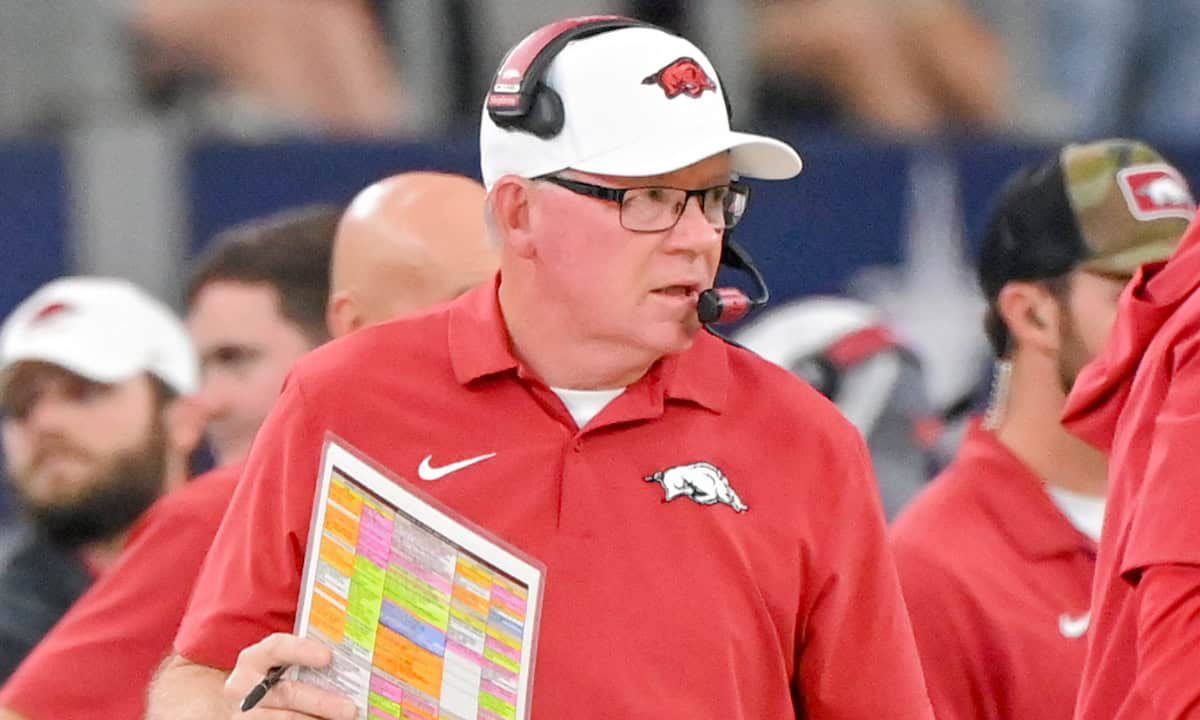With college football’s coaching carousel in full swing, rumors and speculation about potential head coaching hires are dominating the conversation. One name that has recently surfaced in the chatter is Bobby Petrino, currently the offensive coordinator at Texas A&M. Some fans and analysts have floated the idea of Petrino returning to a head coaching role, citing his proven track record as an offensive mastermind. However, while the notion may generate excitement among certain fan bases, it’s worth taking a step back and giving this speculation a much-needed reality check.
There’s no denying Bobby Petrino’s acumen as an offensive strategist. Over his coaching career, he has crafted some of the most dynamic and high-scoring offenses in college football. From his days at Louisville, where he coached Heisman Trophy winner Lamar Jackson, to his work at Arkansas, Petrino has consistently been able to elevate offenses to elite levels.
At Texas A&M, Petrino has already shown flashes of his brilliance in reviving the Aggies’ offense. His schemes are creative, and his ability to develop quarterbacks is undeniable. It’s easy to see why programs in need of an offensive overhaul might consider him as a potential head coach.
But there’s far more to being a head coach than calling plays and designing innovative game plans. A closer look at Petrino’s history reveals why caution should be exercised before handing him the reins of an entire program again.
One of the biggest red flags surrounding Bobby Petrino’s head coaching candidacy is his history of off-field controversies and questionable decision-making. His tumultuous departure from the Atlanta Falcons in 2007, where he resigned midseason to take the Arkansas job, left a sour taste in the mouths of players and fans alike.
Petrino’s tenure at Arkansas, while initially successful on the field, ended in scandal. In 2012, he was fired after a motorcycle accident exposed an extramarital affair with a staff member he had hired. The fallout not only tarnished his reputation but also left the Arkansas program in disarray.
Even after returning to Louisville for a second stint as head coach, Petrino’s tenure ended poorly. His final season in 2018 saw the team finish with a dismal 2-10 record, raising questions about his ability to sustain success and effectively lead a program long-term.
Petrino’s track record suggests that he is best suited for a role as an offensive coordinator rather than a head coach. As a coordinator, he can focus exclusively on what he does best—designing offenses and developing talent—without the administrative and leadership responsibilities that come with being a head coach.
Head coaches must be adept at managing every aspect of a program, from recruiting and staff management to handling player discipline and media relations. Petrino’s history indicates that these areas have been points of weakness in his career. His success as a head coach has often been overshadowed by his inability to maintain stability and harmony within a program.
For programs considering Petrino as a head coaching candidate, the risks may outweigh the potential rewards. While his offensive expertise is undeniable, his past behavior and lack of long-term program-building success should give athletic directors pause.
Furthermore, the college football landscape has changed dramatically in recent years, with the introduction of the transfer portal and Name, Image, and Likeness (NIL) opportunities. Managing these complexities requires a head coach who can not only adapt to the modern game but also foster a positive and stable program culture. It’s unclear whether Petrino is the right fit for such a role in today’s environment.
While the idea of Petrino as a head coach may be questionable, there’s no doubt that he remains an asset as an offensive coordinator. His ability to maximize the potential of his players and craft cutting-edge game plans makes him one of the top offensive minds in college football.
Texas A&M’s offense has benefited from his presence, and other programs in need of a boost on that side of the ball would be wise to consider him for similar roles in the future. However, any school hoping to avoid unnecessary drama or instability should think twice before entrusting him with the responsibilities of a head coach.
The recent talk of Bobby Petrino returning to a head coaching position may excite fans who are desperate for offensive success, but it’s important to approach this idea with a healthy dose of realism. Petrino’s history suggests that while he is a brilliant offensive mind, his track record as a head coach is checkered at best.
Rather than getting swept up in the hype, programs should weigh the risks carefully and consider whether Petrino’s strengths can be better utilized in a supporting role. The bottom line is clear: while Petrino’s name will always carry weight in college football circles, his best contributions may come as an offensive coordinator rather than a program leader.
